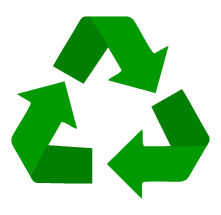
It’s important to note that just because something has a recycling label on it doesn’t actually mean that it CAN or WILL be recycled. This is why its also vitally important for you to choose your recycling partners carefully, or you could end up in DEEP trouble.
If you take a look at any plastic item, whether it’s in your home or your workplace there’s a high chance that you’ll notice some sort of recycling symbol on it – when it comes to toner cartridges you’ll see the WEEE recycling wheelie bin sticker which notifies the user that the product cannot simply be placed into your regular general waste – they must be dealt with specifically. They’ll also have a recyclable symbol (three rotating arrows) on the plastic itself to show that it is recyclable.
Contrary to popular belief, just because this symbol exists on the item doesn’t mean that it will be recycled. Let’s take a step back for a moment and remember that only 9% of the world’s plastic that is produced ends up being recycled – not usually because consumers are being lazy, but because the recycling system and services are simply broken. Recycling is generally an expensive, resource-intensive and difficult to run process that is only profitable when the demand for a specific recycled product is high, which is why the majority of plastics end up at landfill.
This is why it’s of utmost importance that you find a recycler for your toner cartridges who invest passionately in their processes and services, ensuring that the end result of their recycling process doesn’t affect landfill in the short and long-term. While some companies will simply send your toners straight to landfill, others will ‘downcycle’ your products into other products or materials that will only have one more use before they end up in landfill – neither of which are a good end-of-life solution.
During our own process, your items will never EVER end up at a landfill. We prioritise SUSTAINABILITY and as such focus on ensuring the products that we recycle can be completely reused and remanufactured back to their original state, or that they’re dismantled and shredded close to their raw form so that they can be used in another industry by one of our dedicated partners.